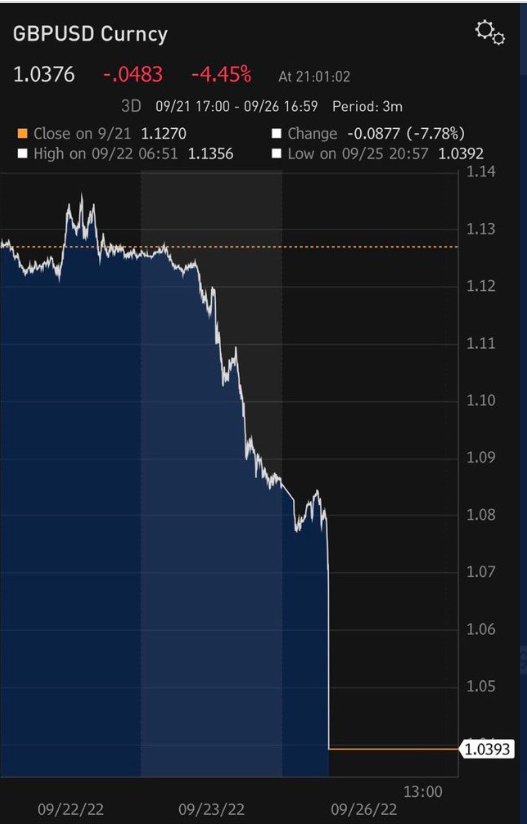Britain's New Government Sinks the Pound
It is 1973 in the UK and a recession sparked by the global oil crisis is about to begin. Inflation is spiking and will soon hit double digits; the government will ration electricity amid power cuts and enforce a three-day work week. A London Evening Standard headline on 7 March perfectly encapsulates Britain’s post-war economic decline: “Absolute Chaos Tonight: Official”.
Just shy of 50 years on, Britain is teetering on the edge of something similar. The economy is in recession, inflation is heading towards an expected 14 percent, strikes are popping up everywhere with talk of a nationwide one in the air, and UK debt to GDP is heading towards 100 percent.
Now, add a potential currency crisis. On Monday, the pound for a time bought just $US1.03, the weakest it has ever been to the greenback. This makes investments in the UK historically cheap for foreigners, but sterling’s slide suggests no one is interested.
The weak pound will clobber importers, boost already record-high fuel prices, and feed inflation into everything from corn to copper to cars. And interest rates will rise with an already hawkish Bank of England saying it will not hesitate to fight cost-of-living rises.
Indeed, the Bank is not happy. It has already been forced to reverse policy and buy bonds in order to calm things down.
To understand how the world’s fourth most-traded currency after the US dollar, euro and Japanese yen ended up like this, you need only to look back to last Friday and the quite remarkable “mini-budget” presented by newly-installed Chancellor of the Exchequer Kwasi Kwarteng.

Kwarteng and Prime Minister Liz Truss took office only three weeks ago after the ousting of Boris Johnson, who lost the support of his ruling Conservative Party. They have steamed into office with the mantra that everything must take a back seat to economic growth and that tax cuts are the way to go.
The “mini-budget” – an explanation for the inverted commas in a bit – was a staggering giveaway, mainly to the wealthy. The cap on bankers’ bonuses was lifted, the top tax rate of 45 percent on those earning more than £150,000 was abolished, a rise in National Insurance tax was dropped as was a planned rise in company tax, and the tax on selling homes was cut.
There was also £60 billion over the next six months in fuel price assistance.
At the other end of the scale, the lower tax rate of 20 percent was cut to 19 percent and some low-income or unemployed people on state benefits will be required to make more effort to get a job.
All this “trickle down” activity was accompanied by other things such as investment zones and lifting limits on fracking but it is the largesse of it all and the requirement of huge borrowing to pay for it that has spooked investors and caused this sterling crisis.
Spend Now, Pay Later
Although Truss and Kwarteng have garnered support from some economists, such as tax-cutting advocate Patrick Minford, an adviser to the Thatcher government in the ‘80s, the new economic regime has been widely greeted as, at best, a risky gamble, at worst, a mistake.
The International Monetary Fund reckons it was the latter. It issued a rare denunciation of the fiscal moves, saying they were likely to increase inequality and push up prices.
The turmoil is a boon to the opposition Labour Party, now leading in some polls, allowing it to note the rich will be the main beneficiaries and trumpet it as a breath-taking case of the Conservatives criticising their own policies of the past decade or so. The Tory plans have earned the moniker "kamikwase budget”, a pun on the chancellor’s first name.
But the market reaction has been brutal, driven by scepticism that such tax cuts in current circumstances will lead to growth, by an orthodox belief that the new policies will fuel inflation, and by the expectation that the cuts will stretch the government’s finances too far.
It has not helped that the announcement was billed as a “fiscal statement” rather than a “mini-budget”, meaning that moves were not analysed and costed first by the independent Office for Budget Responsibility.
This is the reason for the inverted commas. But it is not a geeky financial thing: it means investors and voters do not know what the raft of cuts will do to Britain’s finances, something highlighted by the normally conservative Institute of Directors.
Indeed, as well as sterling’s tumble, UK bond prices have been battered as investors walk away. On Tuesday, the yield on the 30-year Gilt rose above 5 percent for the first time since 2002, taking it above that of the Greek equivalent.
Rein in Inflation
Perhaps most unsettling for investors, meanwhile, is the prospect of the British government going in one direction and the Bank of England in the other.
Just days before Kwarteng’s statement, the Bank raised its main interest rate by 0.5 percentage points to 2.25 percent. It was the seventh rise since December and came with a reduction in the Bank’s stock of UK bonds.
Both moves were designed to rein in Britain’s inflation, last seen running at 9.9 percent year-on-year. But the government’s “mini-budget” has now forced the Bank to buy bonds instead. It will not, however, stop it from aggressively hiking rates.
More than one analyst has seen this as the stuff of banana republics.
Kwarteng’s gamble may work, of course. It may trigger new spending, lift growth, and make people feel happy just in time for the next election which must be held by January 2025.
But with the currency tumbling, the cost of borrowing jumping, GDP tanking, inflation soaring, and interest rates rising, it is all very 1970s. And they have just started to sell bell-bottom trousers on the High Street.
Frequently Asked Questions about this Article…
The British pound has hit a historic low against the US dollar due to a combination of factors, including the recent 'mini-budget' announced by Chancellor Kwasi Kwarteng, which involved significant tax cuts and increased borrowing. This has led to investor skepticism and concerns about inflation, causing the pound to weaken.
A weak pound can impact everyday investors by making imports more expensive, which can increase inflation and affect the cost of living. It also makes UK investments cheaper for foreign investors, but the overall economic uncertainty may deter investment.
The 'mini-budget' includes tax cuts for the wealthy, such as abolishing the top tax rate of 45% for high earners, lifting the cap on bankers' bonuses, and reducing the lower tax rate from 20% to 19%. It also involves significant borrowing to fund these measures, which has raised concerns among investors.
The Bank of England is taking measures to combat inflation by raising interest rates and buying bonds to stabilize the market. Despite the government's fiscal policies, the Bank remains committed to controlling inflation, which may lead to further interest rate hikes.
The new economic policies, including tax cuts and increased borrowing, aim to stimulate growth and spending. However, they carry risks such as increased inflation, higher borrowing costs, and potential long-term damage to the UK's financial stability. The success of these policies remains uncertain and is a topic of debate among economists.
















